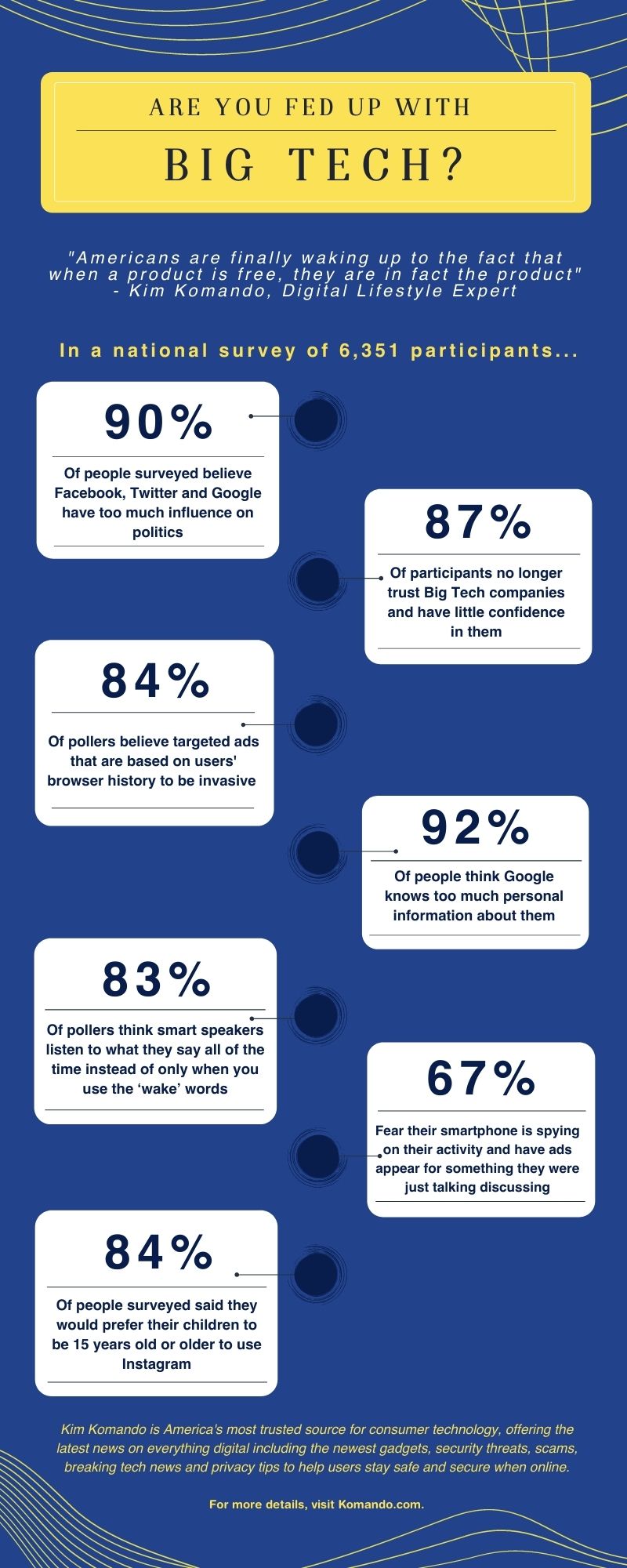Survey: Do you trust Big Tech? 86% of Americans say ‘No’
I hear from callers, listeners, and readers all the time who say they’re just tired of Big Tech companies, their power, and their control. You know the ones — Google, Amazon, Apple, Facebook, Microsoft, and Twitter. It got me wondering, just how widespread is this feeling? I put together a poll and sent it out to subscribers of my free newsletters. The results shocked me, and I bet they’ll surprise you, too.
It really drove home what I suspected. We don’t trust these huge, powerful companies — yet we deeply rely on their services nearly every single day. When’s the last time you got through a day without picking up your iPhone or Android smartphone? What about your Apple or Microsoft computer? Shopping on Amazon or scrolling through posts on Facebook?
Want to know more? Here’s the full press release.
According to a national survey conducted by The Kim Komando Show that polled 6,351 people across the U.S., 86% of participants no longer trust Big Tech companies. The poll underscores the growing concerns surrounding the power and influence Big Tech companies have on society and the little confidence Americans have in the tech power players.
Key survey findings revealed that:
- 82.73% of those polled say they think smart speakers listen to what you say all of the time instead of only when you use the “wake” words. Kim recently explored how users can stop smart devices from listening to you and recording what you say.
- Nearly 60% fear their smartphone is spying on their activity and have had advertisements populate for something they were just discussing. Thankfully, Kim explained in a recent Daily Tech Update episode that this phenomenon is likely dumb luck!
- 84% of survey participants believe targeted ads that are based on browser history to be invasive. Good news, Komando.com recently recommended a privacy tip to say “no thanks” to personalized ads. Don’t want to use Chrome? Here are the best browsers for privacy.
- Participants surveyed believe Big Tech has too much influence on politics, with Facebook and Twitter each at 92%.
- 67% of Facebook users would be willing to delete their account knowing that the social media platform tracks everything, sells data and cannot control what is posted on the site. If this applies to you, Kim discusses how exactly you can delete your Facebook (and Twitter) profiles for good. In an episode of Kim Komando Today, Kim talks to the man behind a new social network taking on Facebook that puts users’ privacy first. Tap or click here to listen.
- 92% of people surveyed think Google knows too much information about their personal lives. To combat this, Kim has rounded up alternatives to Google that won’t track your information.

“Since the onset of COVID-19, Big Tech companies have seen accelerated demand as the world has shifted to a more digitalized landscape. Across the board, the survey demonstrated that a majority of individuals worry that Big Tech has too much influence or know too much about our personal information, yet nearly 4 billion people use social media worldwide and the numbers continue to grow,” said digital-lifestyle expert Kim Komando, the talk radio and podcast host known for the popular The Kim Komando Show. “I do have hope that Americans are finally waking up to the fact that when a product is free, they are in fact the product.”
In addition to gathering an understanding of Americans’ most recent perception of Big Tech companies, the survey found that 76% used Google daily, followed by Microsoft (60%), Apple (49%), and Facebook (45%). Of the people surveyed, 40% reportedly used Amazon daily with 89% active shoppers on Amazon.com.
“Interestingly, with the world becoming more digitalized and the news of Instagram for Kids, more than 84% of people surveyed said they would prefer their children to be over the age of 15 in order to use Instagram. Maybe we are starting to see the damage social media does to our adult lives and how it’s robbing children of a healthy, happy start to their own,” Kim Komando added.
The national survey was disseminated to subscribers of The Kim Komando Show newsletters and 6,351 individuals across the United States participated.
Tags: Apple, newsletters
